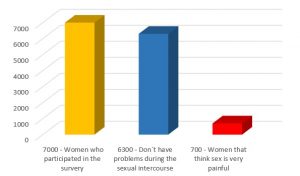In a world where sex is as common as brushing your teeth in the morning and one-night stands are the main conversations in your group of friends, how do you cope with the inability to have sexual intercourse?
Muscle contractions, constant pain and frustration — this is a summary of vaginismus. According to NHS, the psychosomatic condition occurs when “the vagina suddenly tightens up just as you try to insert something into it”. In other words, vaginismus is the tightening of the muscles located in the pelvic floor, making it impossible for any type of penetration.
There are multiple causes of this psychological disorder. Stella Anna Sonnenbaum, a certified sexological bodyworker, told Voice of London: “Vaginismus occurs after trauma like rape or abuse, but also after childbirth or medical interventions, or it can be a condition where subconsciously the insertion of a penis is prevented, but also the insertion of a speculum for a smear test may be impossible.”

Photo: Courtesy of Cristian Newman via Unsplash
The list of potential causes doesn’t start or end with physical traumas. Vaginismus affects both the body and mind, because the involuntary spasms are triggered to protect what the brain considers “a threat”. But why do some women consider what others would judge as normal, an agony?
Most of the psychological trauma that can ruin a woman’s sex life is generated by the pressure to “do it”. Early experiences and the lack of comfort in a relationship can transform a female’s intimate life into a minefield. “Women feel the pressure to have sex as soon as possible. If their friends lost their virginity at a fragile age, they feel like they have to do it the same way,” said Karen Aram, a psychosexual therapist, during an interview with VoL.
Many would think that this disorder, which makes having sex painful, is the result of an insufficient sexual education. But, according to Karen Aram, too much information about “the first time” can damage the image of an intimate relationship in a female’s perception.
![]()
Photo: Courtesy of Rawpixel via Unsplash.
“When someone gives you an introduction to what sex implies, nobody is going to tell you that it a pleasurable act or that it is a marvellous way to connect with your partner. On the contrary, you will be told that it is very painful, that you expose yourself to both an unwanted pregnancy and an unpleasant STD,” she affirmed.
Even though vaginismus isn’t a well-documented condition, it is one of the most common sexual dysfunctions. A recent study has revealed that nearly one in 10 British women consider sex a painful experience. The survey, which was conducted by obstetrics and gynaecology journal BJOG, examined the sexual life of 7,000 women.

E., whose identity will remain anonymous, is one of the females who are struggling to have a normal sexual life. “I can’t quite remember when I realised there is something wrong with me, but I do remember that sex was never explained in a way that suggested it would be physically pleasurable – not by my mom, not by my friends, not by anyone. All of my relationships ended because I was unable to have sex, therefore I felt disabled, because I couldn’t do the most basic thing in the world,” she told VoL.
“I felt rejected by everyone around me, every boy looked at me with disgusted eyes when I told them about my problem. All of them treated me like I had a broken body, a body which they didn’t want to see until it was fixed. As the time passed by, my wrecked body became more than just that because I began feeling like a wrecked woman. Vaginismus is really difficult to deal with, especially when all of your friends are talking about their intimate relationships while you are fighting back tears and feeling miserable. All of those feelings just because you have no control over your inability to have sex.” E. further confessed.

Photo: Courtesy of Niklas Hamann via Unsplash.
Although vaginismus seems incurable, there are a lot of treatments which have a high success rate. Women who suffer from the tightening reflex need to work with both their mind and body in order to heal.
“We try to equip women with confidence in themselves and we encourage them to explore their bodies. Vaginismus is much about what kind of relationship we have with our intimate zones. Also, I tell my patients that sex is all about confidence, opening, relaxation, control and permission giving. Most of them think that sex is all about pain, therefore I try to redirect their thinking and explain to them that it actually is a pleasurable act,” said Karen Aram.
The therapy helps the patient to relax and get rid of both anxiety and negative thoughts. Coaching techniques are also a successful method to overcome vaginismus. “Sexological Bodywork is a hands-on coaching technique, and in my experience is really effective in resolving the issue,” Stella Anna Sonnenbaum told Voice of London.
“We can go at the client’s pace and set boundaries and intentions for each session. Sex-negative beliefs, shame or embarrassment may come up and can be addressed. Unlike psychosexual therapists who send clients home with homework after talk therapy, we can actually physically touch the client with consent, and facilitate pleasure, including inserting gloved fingers into the vagina, and use vibrators to create arousal,” she added. “Client feedback is crucial at all stages, and an initial session may, or may not, include one-way intimate touch.”
I’ve been working on this article for a while now and I’m very excited to be able to share it with you. I’ve interviewed a number of people dealing with vaginismus to try and give a comprehensive look at what it’s like living with the condition
— Louise MacGregor (@cutpriceguignol) November 22, 2018
https://platform.twitter.com/widgets.js
I was similarly frustrated by the lack of information about vaginismus. So much so that I enrolled for a PhD to research it and set up a website where people could go for information. Don’t get disheartened #MakingADifference
— Maria McEvoy (@IrishVaginismus) November 21, 2018
https://platform.twitter.com/widgets.js
last night I went to bed so early that I forgot to take my birth control & when I realized this morning, I panicked at the thought that I might get pregnant even though that’s literally impossible thanks to #vaginismus 🤦🏻♀️
— Carissa Nicole Winn🌔 (@Carissa12Nicole) July 4, 2018
https://platform.twitter.com/widgets.js
While vaginismus is one of the most encountered sexual disorders, it remains a taboo subject for many women. Females feel ashamed and frustrated because of their build-up chastity belt and never seek help from an expert. “I’m not sure if I have overcome this disorder yet, but there are many other beautiful and strong women who deep down cry and scream every time they have sex, just because they think that sex is painful. It shouldn’t be”, E. declared for VoL.
Featured Image: Gabriel Matula via Unsplash.
Words and graphs: Ioana Catalina Oblu | Subbing: Shruti Tangirala

